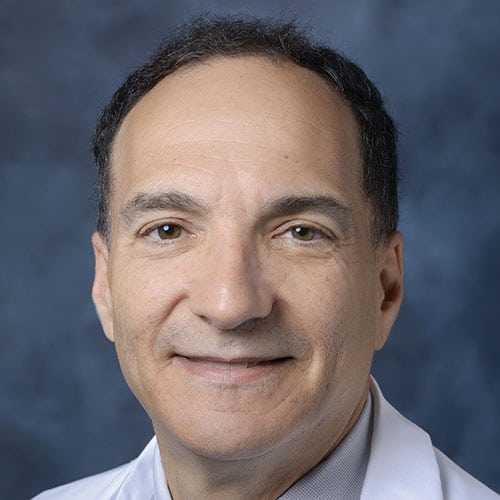 WASHINGTON, DC – OCTOBER 05: U.S. President Donald Trump removes his mask upon return to the White House from Walter Reed National Military Medical Center on October 05, 2020 in Washington, DC. (Photo by Win McNamee/Getty Images)
WASHINGTON, DC – OCTOBER 05: U.S. President Donald Trump removes his mask upon return to the White House from Walter Reed National Military Medical Center on October 05, 2020 in Washington, DC. (Photo by Win McNamee/Getty Images) Our supercharged political environment has influenced the commentary on President Donald Trump’s recent diagnosis of COVID-19. Social media posts are rife with humor and celebration. Having seen patients struggle with the incessant cough and air hunger of this horrific illness, I hope we can still view the president as a husband, a father and a senior citizen still battling a life-threatening illness. He deserves our thoughts and prayers. At the same time, compassion should not prevent us from facing the issues raised by his illness.
Lack of transparency in presidential health has a long, bipartisan history. The public never knew about John F. Kennedy’s Addison’s disease and his need for daily injections. Woodrow Wilson’s debilitating stroke was concealed, as Edith Wilson directed the government, ostensibly in response to her husband’s instructions. Yet the office and the country have changed enormously since the days of Kennedy and Wilson. With troops overseas, millions receiving federally-funded healthcare and an economy dependent on government stimulus packages, presidential actions now affect us on a day-to-day basis. This impact, along with the demands of the modern media, reasonably changed expectations.
Unfortunately, Trump’s administration and physicians failed to meet current standards for truth and transparency. His medical team initially commented that Trump had not needed oxygen before departing the White House for Walter Reed — they subsequently reversed themselves on this straightforward fact. Then, during a Sunday news conference, his doctors commented that Trump had “the usual findings” in lung imaging but twice evaded questions on the specifics. The “usual findings” for a COVID-19 patient with low oxygen would be patches of pneumonia. The following day, when asked if Trump had pneumonia, the doctors evaded answering by citing HIPAA, the federal patient privacy law. Why would Trump’s lung findings be any more private than the trove of information already provided? In an era of transparency, the fig leaf of patient privacy cannot justify the doctors’ refusal to “come clean” on Trump’s likely diagnosis.
In an era of transparency, this selective release of information borders on deception.
Trump’s doctors’ performance echoes the president’s own recent admission to journalist Bob Woodward that he minimized the dangers of COVID-19. The administration approached both issues as though the truth would create doubt that we are indeed “great again.” Although the public may assume the White House passes truth through a political filter, we expect — and deserve — better from medical professionals. In briefing the press, the president’s care team should act as medical doctors, not spin doctors. They never learned the key Watergate lesson: the truth will emerge.
More important than the medical team’s obfuscation is the administration’s flouting of the Centers for Disease Control and Safety (CDC) guidelines and District of Columbia regulations during their Rose Garden event on Sept. 26. Photos show those that subsequently tested positive tightly packed in a crowd, the vast majority unmasked. Hardly a week had passed since CDC Director Robert R. Redfield testified on the critical importance of masks, stating that they might be more protective against the virus than a vaccine. Did the event attendees think that they were immune?
Unfortunately, the true fallout from the Rose Garden event, like Trump’s unmasked campaign rallies, will never be fully known. The media will follow the cases of high profile staff members. But what about those in the homes of those infected? How many maids, nannies or grandparents will suffer? Who in the long chain of future cases will die?

Consider Herman Cain, who was in good health when he sat, sans mask, in a crowd at Trump’s Tulsa rally on June 10. Although we cannot be certain where Cain contracted the virus, the timeline of his hospitalization and his death on July 30 were consistent with infection at the Tulsa rally. At the time of Trump’s rally, Tulsa’s COVID-19 cases ran at 100 new cases daily. Five weeks later, it peaked at 1700. Tulsa’s public health officer later commented that the rally “likely contributed” to the surge.
Trump is fortunate to have concierge “helicopter care” for COVID-19. Those in the chains of infections related to his events don’t have that luxury. The 2.3 million Americans that lost insurance during the first two years of the Trump presidency and the millions more that lost coverage during the pandemic will struggle to get healthcare and may go broke receiving it. Twenty million have their insurance lifeline threatened by the president’s attempts to strike down the Affordable Care Act.
As we pray for the president’s recovery, we can only hope that he realizes that following public health advisories protects ourselves and others from the ravages of this illness. Perhaps he also can gain insight into the fact that, in the age of a pandemic, access to care makes the difference between life and death.
Daniel Stone is regional medical director of Cedars-Sinai Valley Network and a practicing internist and geriatrician with Cedars Sinai Medical Group. The views expressed in this column do not necessarily reflect those of Cedars-Sinai.






















 More news and opinions than at a Shabbat dinner, right in your inbox.
More news and opinions than at a Shabbat dinner, right in your inbox.